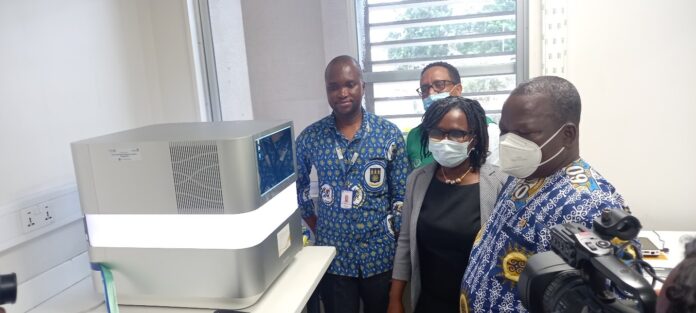
The Africa CDC, through its Pathogen Genomics Initiative, has presented genomic sequencing equipment and reagents to the Noguchi Memorial Institute for Medical Research (NMIMR) to enhance its research into diseases of public health.
The gesture is part of efforts to ensure that NMIMR adopts best practices and techniques in its work, as it has become Africa CDC’s sequencing hub responsible for Ghana, Togo, Benin, Sierra Leone and Liberia.
Speaking during the presentation, Director for NMIMR Prof. Dorothy Yeboah-Manu expressed appreciation to Africa CDC, stating that the equipment is of crucial importance to the institution’s core mandate.
“Our first mandate is to conduct research into diseases of public health importance to Ghana, the West Africa sub-region and African continent as a whole. And this requires a very important understanding of the pathogen biology genomics, evolution and emergence for variants. These are very crucial, in that it allows for determination and also design of interventions which are accurate and precise.
“Thus, with this information we will be able to design the needed rapid diagnostics and reserve needed vaccines as well as medicines for the control of not only infectious diseases but also for non-communicable diseases,” Ms. Yeboah-Manu emphasised.
She added that the equipment will further help the institute give needed assistance to the Ghana Health Service (GHS) with the introduction of vaccines, and also to understand disease mechanisms.
“It will allow us to not to only understand disease mechanisms to offer understanding for the implementation of interventions, but also help us support GHS in their surveillance activities as well as for evaluation of interventions.
“Therefore, with these genomics, we will be able to support in terms of the emergence of new variants; and with the introduction of vaccines, how successful these vaccines are; and also to evaluate diagnostics,” she said.
Ms. Yeboah-Manu further indicated that even though the infection rate of COVID-19 seems to have gone down, NMIMR will not let their guard down; and with the new genomic sequencing machine, will be able to research for other variants that may emerge.
“We have to routinely continue to survey for the emergence of new variants. This machine is going to give us the opportunity; such that now Noguchi has the capacity to sequence 2,000 genomes in a week. This is crucial, because we have now been advised to take our vaccinations seriously. With the vaccination, it hasn’t ended. We have to continue studying the emergence of new variants,” she said.
A representative from Africa CDC, Dr. Sarah Mwangi, said the presentation is part of the vision to integrate pathogen genomics into routine public health surveillance systems for rapid and timely responses to infectious disease threats in Africa through access to pathogen genomics technology, expertise, and responsible data-sharing.
“As we officially hand over the genomic sequencing equipment donated to the Noguchi Memorial Institute for Medical Research, we are indeed delighted with the great strides made with regard to genomic sequencing for SARS-CoV-2 in a short span of time; and we look forward to mapping this potential for leveraging the genomic surveillance capacity obtained during the COVID-19 pandemic for priority pathogens for genomic surveillance within the Republic of Ghana. We anticipate that these will be incorporated into the national public health plans/strategies,” Dr. Mwangi said.









